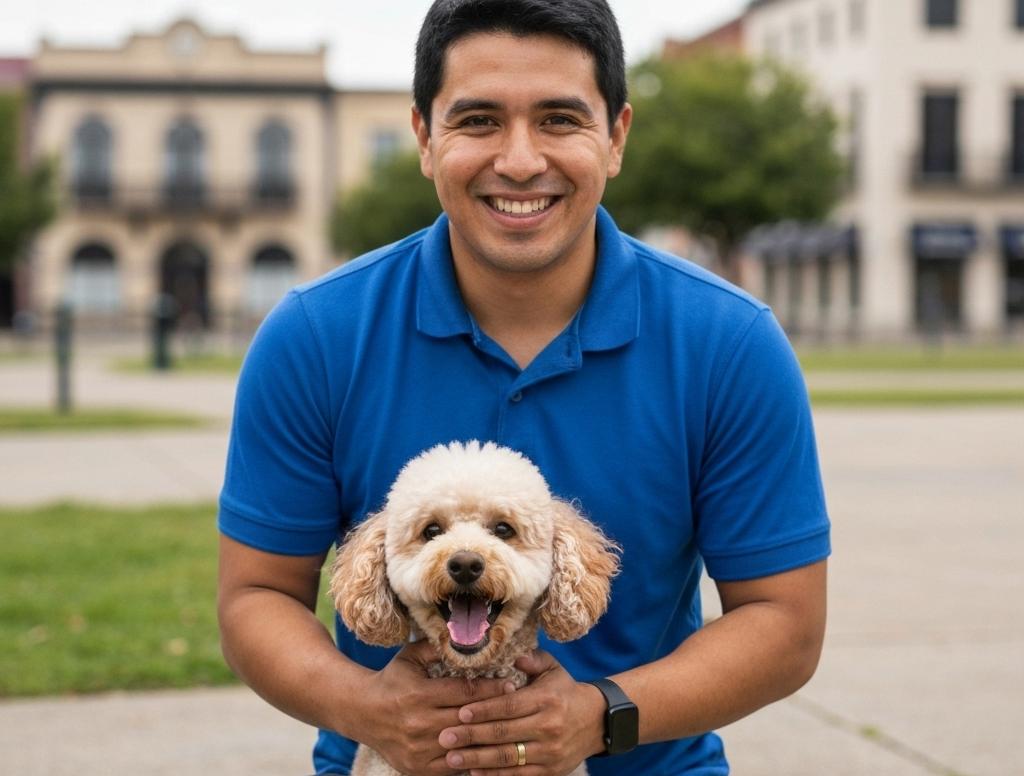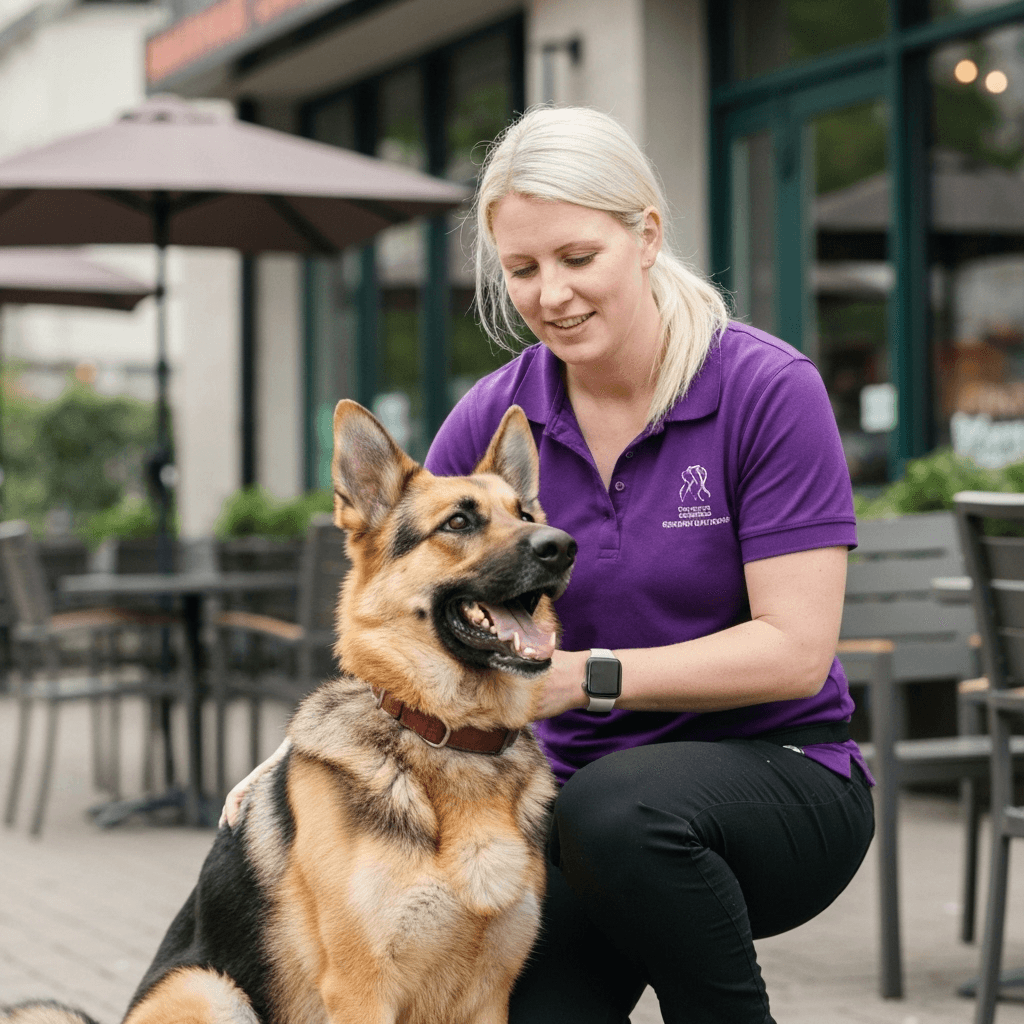Your Complete Guide to Choosing a Dog Trainer in Alabama
Finding the right dog trainer in Alabama isn’t just about teaching your pup to sit and stay. Whether you’re navigating busy college towns like Auburn and Tuscaloosa, dealing with the summer heat and humidity, or preparing for those chaotic football weekends, your dog needs skills that work in real Alabama life.
The best trainers understand what life looks like here. They know your dog needs to walk calmly past tailgaters, stay cool during outdoor events, and handle everything from quiet neighborhood streets to crowded farmers markets.
What Makes a Good Dog Trainer in Alabama
Start by looking for someone who uses positive reinforcement methods. This approach builds trust while teaching your dog what you want them to do, rather than just punishing what you don’t want.
Professional credentials matter more than you might think. Look for trainers with certifications like KPA-CTP, CPDT-KA, IAABC-CDBC, or CBCC-KA. If these letters don’t mean much to you yet, take a look at this guide to dog trainer certifications to understand what each one represents.
The right trainer will also understand Alabama’s unique challenges. They should know how to help your dog handle humid weather, busy outdoor events, and the social expectations that come with living in friendly Southern communities. Ask how they incorporate real-world practice into their training plans.
Since Alabama doesn’t require state licensing for dog trainers, most work under a local business license and carry liability insurance. Don’t be shy about asking to see proof of both.
Training Methods That Actually Work

Positive reinforcement remains the gold standard because it creates lasting behavior changes without damaging your relationship with your dog. Here’s what different training approaches can offer:
Basic obedience and city manners focus on the fundamentals like sit, down, stay, and loose leash walking. These skills become essential when you’re navigating downtown areas or attending outdoor events where your dog needs to be polite around strangers.
Puppy training tackles the early stuff that makes or breaks your experience as a dog owner. This includes potty training, bite inhibition, and socialization during those critical early months. Alabama puppies especially need exposure to different sights, sounds, and experiences they’ll encounter throughout the state.
Behavior modification helps dogs work through fear, reactivity, or aggression using gradual, science-based approaches. This becomes particularly important if your dog struggles with loud noises from football stadiums or gets overwhelmed by crowd situations.
You’ll find different formats too. In-home training brings the trainer to your environment, which helps with house manners and real-life situations. Group classes provide controlled distractions and socialization opportunities. Private lessons offer customized attention for specific goals.
Some trainers offer day training or board and train programs where they work with your dog during the day or for extended periods. These can accelerate progress, but the trainer still needs to teach you how to maintain what your dog learned.
Stay away from trainers who rely on intimidation, shock collars, or punishment-based methods. These approaches might seem faster, but they often create new problems and can damage your dog’s confidence.
What Training Costs in Alabama
Training prices vary quite a bit across the state, with metro areas like Birmingham and Huntsville typically running higher than smaller towns. Here’s what Alabama dog owners can expect to pay:
| Service Type | Average Cost in Alabama |
|---|---|
| Group classes, 4 to 6 weeks | $120 – $250 |
| Private lessons, 60 minutes | $80 – $150 per session |
| Puppy classes or package, 4 to 6 lessons | $250 – $500 total |
| Day training, per week | $350 – $800 |
| Board and train, 2 to 4 weeks | $1,500 – $3,500 total |
| Behavior consult for reactivity or fear | $100 – $200 for the first session |
Many trainers offer package deals that reduce the per-session cost. Complex behavior issues or work with highly credentialed trainers typically cost more, but the investment often pays off in faster, more reliable results.
Alabama’s Dog Laws and Practical Requirements
Every dog in Alabama must have a current rabies vaccination. The Alabama Department of Public Health provides official guidance on this requirement: Alabama Rabies Info.
Leash laws vary by city and county since there’s no statewide requirement. Most communities require leashes in public spaces and proof of rabies vaccination. Your local animal services office can give you specific rules for your area, including any breed restrictions or licensing requirements.
Some Alabama cities require pet licenses, while others rely on rabies tags from veterinarians. Check with your vet or local animal control to understand what’s required where you live.
For trainers, Alabama doesn’t issue state licenses, but responsible professionals carry liability insurance and follow local business licensing requirements. They should also have clear policies about safety, cancellations, and any transportation services.
Essential Questions for Potential Trainers
Before committing to any trainer, ask these important questions:
- What training methods do you use, and how do you ensure sessions remain positive and stress-free?
- What credentials or education do you have, such as CPDT-KA or KPA-CTP?
- How will you customize the training plan for my specific dog and living situation?
- What training formats do you offer (group classes, private lessons, in-home, board and train)?
- How do you handle behavior issues like reactivity, fear, or separation anxiety?
- What exactly is included in your packages, and are there additional costs for travel or materials?
- Do you carry liability insurance, and can you provide proof?
- How will we measure progress and adjust the plan as needed?
- For behavior cases, do you work with veterinarians when necessary?
- What homework or practice will I need to do between sessions?
Dog-Friendly Places to Practice in Alabama
These locations provide excellent opportunities to practice training skills in real-world settings. Always follow posted rules and keep dogs leashed unless in designated off-leash areas:
Remy’s Dog Park at Red Mountain Park in Birmingham offers one of the largest fenced areas in the state for safe off-leash practice: Remy's Dog Park Details
Huntsville maintains several dog park locations throughout the city for convenient training opportunities: Huntsville dog parks info
Kiesel Park Dog Park in Auburn provides open space perfect for recall training: Kiesel Park Facilities
Will May Dog Park at Sokol Park in Tuscaloosa features separate areas for different sized dogs: Will May Dog Park info
Unleashed Dog Park in Orange Beach gives coastal dog owners a well-maintained training space: Orange Beach Dog Park Info
Alabama State Parks welcome leashed dogs on most trails and in many campgrounds, providing excellent real-world training opportunities: Alabama State Park Dog Friendly Policies

Common Questions About Dog Training in Alabama
How much does in-home dog training cost?
Most Alabama trainers charge $80 to $150 per hour for in-home sessions. The final price depends on your location, the trainer’s experience, and whether you purchase multiple sessions at once.
Is in-home dog training worth the extra cost?
In-home training often provides the best value because you’re practicing in the environment where problems actually happen. It’s particularly effective for house manners, leash training on your regular walking routes, and addressing specific behavioral issues in context.
Can I hire someone to house train my dog?
Yes, many trainers offer puppy packages or day training that includes house training. However, you’ll still need to be consistent with the plan between training sessions to see lasting results.
What is the 3-3-3 rule for dog training?
This guideline helps set realistic expectations for new or rescued dogs. It suggests dogs need about 3 days to decompress from major changes, 3 weeks to learn new routines, and 3 months to feel completely settled in their new environment.
How long does dog training take?
Most families notice improvements within 2 to 4 training sessions when they practice consistently at home. Basic obedience typically takes 4 to 8 weeks of regular work. Behavior modification for issues like reactivity or aggression usually requires longer timelines with patient, systematic approaches.
What should I bring to group training classes?
Pack a flat collar or harness, a standard 6-foot leash, plenty of small, high-value treats, water for your dog, and current vaccination records. Leave retractable leashes at home since they create safety issues in group settings.
What are Alabama’s leash laws?
Alabama doesn’t have a statewide leash law, but most cities and counties require leashes in public areas. Many also have ordinances about dogs running loose or creating nuisances. For an example of local regulations, check Jefferson County’s animal services page: Jefferson County Animal Services
Do I need to license my dog in Alabama?
Licensing requirements vary by location. Some cities require pet licenses while others rely on rabies vaccination tags from veterinarians. Contact your local animal services department or veterinarian to understand your area’s specific requirements.
What vaccinations does Alabama require for dogs?
Rabies vaccination is mandatory statewide. Your veterinarian may recommend additional vaccines like distemper-parvo or bordetella based on your dog’s lifestyle and risk factors. Official rabies information is available from the Alabama Department of Public Health: Rabies requirements
Are dog trainers required to be licensed in Alabama?
No, Alabama doesn’t issue state licenses for dog trainers. Many professional trainers pursue voluntary certifications such as IAABC-CDBC or CBCC-KA and carry liability insurance to demonstrate their professionalism.
Where can I safely practice off-leash recall?
Fenced dog parks provide the safest environment for off-leash training. Remy’s Dog Park in Birmingham offers plenty of space for recall practice within secure boundaries: Remy’s Dog Park. Start in quieter areas and gradually add distractions as your dog improves.
Which dog parks welcome training activities?
Most Alabama dog parks allow training as long as you’re respectful of other users:
- Remy’s Dog Park at Red Mountain Park in Birmingham
- Dog Spot parks throughout Huntsville
- Kiesel Park Dog Park in Auburn
- Will May Dog Park in Tuscaloosa
- Unleashed Dog Park in Orange Beach
Always check posted rules, keep your training equipment organized, and avoid blocking entrances or high-traffic areas.
What beaches and trails allow dogs for training practice?
Public beaches in Gulf Shores and Orange Beach don’t permit dogs, but Alabama State Parks offer excellent alternatives. Most state parks welcome leashed dogs on trails and in campgrounds, providing great opportunities for real-world training practice. Review the complete guidelines here: Alabama State Parks rules
Do trainers need insurance in Alabama?
While the state doesn’t mandate specific insurance for dog trainers, reputable professionals carry general liability coverage. Many training venues and public facilities require proof of insurance, so don’t hesitate to ask potential trainers about their coverage.
How important are trainer certifications?
Certifications help you evaluate a trainer’s education and commitment to professional standards. Common credentials include KPA-CTP, CPDT-KA, and IAABC-CDBC. You can learn more about what each certification means here: dog trainer certifications.
The right dog trainer makes all the difference in helping your dog become a confident, well-behaved companion who can handle everything Alabama life throws their way. Take time to find someone who uses humane methods, understands your local environment, and can guide both you and your dog toward your training goals. With consistent practice and the right professional support, you’ll build the strong partnership that makes dog ownership such a rewarding experience.
